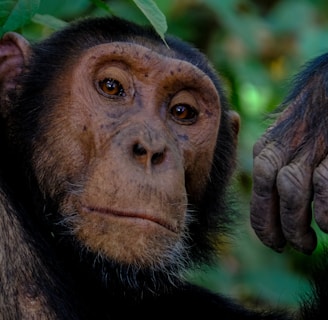No More Monkey Business, the struggles of the endangered chimp
In the dense jungles of Africa, an ancient and remarkable species faces a grave threat – the endangered chimpanzee. Chimpanzees, our closest living relatives in the animal kingdom, are on the brink of extinction, and the silent roar of their struggle echoes through the diminishing forests. In this blog post, we’ll delve into the reasons behind their endangerment, the critical role they play in maintaining the ecological balance, and the urgent need for conservation efforts to ensure their survival.
12/31/20232 min read


Chimpanzees, scientifically known as Pan troglodytes, are intelligent, social beings with complex emotions and behaviors. Found in the wild across Central and West Africa, their populations have been steadily declining due to a myriad of threats. One of the primary culprits is habitat loss. As human populations expand, forests are cleared for agriculture, logging, and urban development, leaving chimpanzees with shrinking and fragmented habitats.
Poaching is another significant threat. Infant chimpanzees are often captured for the illegal pet trade, and adults are hunted for bushmeat. The demand for exotic pets and traditional medicines further exacerbates the decline of chimpanzee populations. Additionally, infectious diseases like Ebola pose a severe threat, as chimpanzees are susceptible to many of the same diseases as humans.
Ecological Importance:
Chimpanzees are keystone species, playing a crucial role in maintaining the health and balance of their ecosystems. They are seed dispersers, helping to regenerate forests by spreading seeds throughout their territories. Their feeding habits also influence vegetation, preventing the overgrowth of certain plant species and promoting biodiversity. Furthermore, their complex social structures and behaviors contribute to the intricate web of life in the forest.
Conservation Efforts:
Efforts to save the endangered chimpanzee involve a multi-faceted approach. Conservation organizations are working tirelessly to protect and restore chimpanzee habitats, establish wildlife corridors to connect fragmented areas, and combat illegal poaching and the pet trade. Education and community outreach programs are also crucial to raise awareness about the importance of chimpanzee conservation and to foster a sense of responsibility among local communities.
Global initiatives are underway to strengthen legal frameworks for wildlife protection, enhance anti-poaching efforts, and promote sustainable practices that mitigate the impact of human activities on chimpanzee habitats. Additionally, research into diseases affecting chimpanzees and efforts to control disease outbreaks are vital to their survival.
The endangered chimpanzee stands as a symbol of the delicate balance between humanity and the natural world. Their struggle for survival is not just their fight; it is a call to action for us all. By supporting and contributing to conservation efforts, we can ensure that the silent roar of the endangered chimp is replaced by the vibrant sounds of healthy, thriving ecosystems. It’s time for us to recognize the interconnectedness of all life on Earth and strive to protect and preserve the incredible biodiversity that enriches our planet.
Contacts
contact@terra-rising.com
